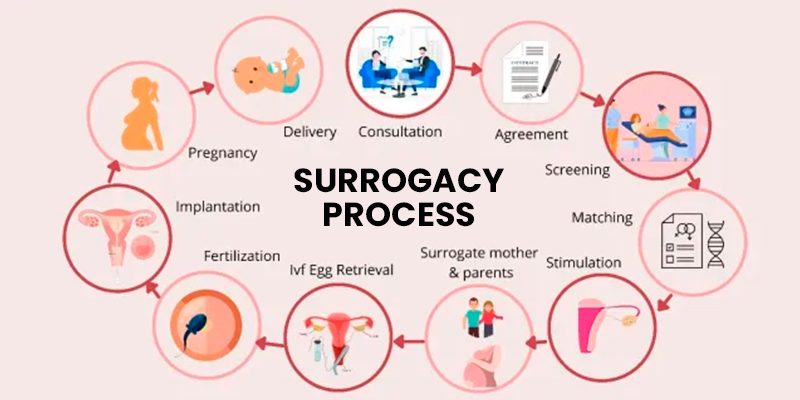An In-Depth Exploration of Surrogacy
Surrogacy is a practice that has gotten a lot of attention and has led to a lot of talks. It is at the intersection of deep human wants, complicated legal systems, and tricky moral questions. Surrogacy, in which a woman holds and gives birth to a baby for another person or couple, is more than just a medical process. It goes into the depths of mental links, complicated laws, and how people think about things in general says the expert of a surrogacy Center in Kerala, Trivandrum
Surrogacy used to be a pretty uncommon choice, but these days, a lot of people and couples look into it when they are having trouble getting pregnant or want to find other ways to become parents. But the journey of surrogacy is still clouded by misunderstandings, uncertainties, and different points of view, even though it is becoming more common. It’s important for everyone, not just the people directly involved, to understand all the complicated parts of this process.
Best Surrogacy Clinic in Kerala
A reputable best surrogacy Clinic in Trivandrum, Kerala, upholds the highest standards of ethical practice, legal compliance, and comprehensive care. With a strong emphasis on thorough screening processes for surrogates and intended parents, state-of-the-art medical facilities, and a commitment to transparent communication, the Best Surrogacy Clinic in Kerala, Trivandrum provides a supportive and nurturing environment. Expertise in reproductive medicine, coupled with emotional support services and legal guidance, ensures a holistic and empathetic approach throughout the surrogacy journey. Their dedication to respecting cultural diversity, maintaining confidentiality, and offering post-pregnancy care underscores their commitment to facilitating a positive, ethical, and well-rounded surrogacy experience for all involved parties.
What is surrogacy in Kerala, Trivandrum?
Surrogacy is an amazing way to become a parent. It gives people or couples who are having trouble getting pregnant or who can’t take a child to term hope and options. At its core, surrogacy is when a woman, called the surrogate or gestational carrier, carries a child for someone else or a couple, who are called the intended parents. This complicated process usually happens over a number of steps that include medical treatments, legal issues, and mental trips.
Surrogacy in Kerala, Trivandrum
surrogacy in Kerala, Trivandrum comes in two primary types: traditional surrogacy and gestational surrogacy. These methods differ in the genetic relationship between the surrogate and the child she carries.
-
Traditional Surrogacy:
In traditional surrogacy, the surrogate is genetically related to the child she carries. This occurs because the surrogate’s own egg is fertilized with the intended father’s sperm or donor sperm through artificial insemination or intrauterine insemination (IUI). As a result, the surrogate is both the biological mother and the gestational carrier of the child. Traditional surrogacy presents unique legal and emotional complexities due to the genetic connection between the surrogate and the child.
-
Gestational Surrogacy:
Gestational surrogacy, on the other hand, involves the implantation of an embryo created using in vitro fertilization (IVF). The embryo is formed using the eggs and sperm of the intended parents or donors and then transferred to the uterus of the surrogate. In this scenario, the surrogate has no genetic relationship with the child she carries. She acts solely as the gestational carrier, and the intended parents are the biological parents of the child.
Gestational surrogacy is more commonly practiced due to its potential to bypass some of the legal and emotional complexities associated with traditional surrogacy. It allows for a clearer delineation of parental rights and typically involves less genetic and emotional attachment between the surrogate and the child.
Both forms of surrogacy require careful consideration of legal, emotional, and medical aspects. The choice between traditional and gestational surrogacy often depends on individual circumstances, legal regulations in the region, and the preferences of the intended parents and surrogates.
Gestational surrogacy, on the other hand, involves putting a baby into the surrogate’s uterus that was made from the eggs and sperm of the intended parents or donors. In gestational surrogacy, the surrogate has no DNA ties to the child she holds. This makes the method more common and easier to officially follow in many places.
The process of reproduction usually starts with a careful choosing process. Parents-to-be often work closely with agencies or look for an ideal surrogate on their own, taking into account things like medical background, mental readiness, and connection between the two people. In the same way, surrogates go through a lot of tests and screenings to make sure they are healthy physically and emotionally and that they can carry a safe baby.
Once two people are matched, formal contracts are written describing each person’s rights, duties, and expectations. These deals cover a wide range of topics, from child support to parenting rights. They make sure that everyone understands and is safe.
After this, medical treatments are done to make eggs through in vitro fertilization (IVF) using the genetic material of the planned parents or gametes from volunteers. After that, the eggs are carefully moved to the surrogate’s uterus at the right time. During the pregnancy, the surrogate gets medical care, and the intended parents often attend important events like doctor visits and ultrasounds, making the experience feel like a shared one even though they are not in the same place.
Surrogacy covers a wide range of feelings. Intended parents often deal with a mix of hope, worry, and excitement. Surrogates, on the other hand, go through a journey marked by compassion, kindness, and the satisfaction of helping others become parents. To get through this complicated web of feelings, it’s important for everyone involved to be able to talk to each other and offer mental support.
There are a lot of different legal, cultural, and moral issues that come up in different parts of the world when it comes to surrogacy. Some countries have strict laws against surrogacy, while others only have some or none at all. This means that different things happen and problems arise.
Why people opt for Surrogacy?
Individuals or couples opt for surrogacy for various reasons, often related to challenges with fertility, medical conditions, or personal circumstances that prevent them from conceiving or carrying a child to term. Here are some common situations where individuals or couples might choose surrogacy:
- Infertility: Couples facing infertility issues, such as recurrent miscarriages, reproductive health problems, or conditions that prevent them from carrying a pregnancy, might opt for surrogacy to fulfill their desire for parenthood.
- Medical Conditions: Individuals or couples dealing with medical conditions that make pregnancy risky or impossible, such as severe heart conditions, uterine abnormalities, or certain genetic disorders, may choose surrogacy as a safer alternative to traditional pregnancy.
- Same-Sex Couples: Same-sex male couples, lacking a female partner, might opt for surrogacy to have a biological child using donor eggs and a surrogate’s uterus. Similarly, female same-sex couples might opt for surrogacy to have a child genetically related to one partner through IVF and surrogacy.
- Single Individuals: Single individuals who wish to become parents and have no partner or the ability to conceive may choose surrogacy to fulfill their dream of having a biological child.
- Previous Pregnancy Complications: Individuals or couples who have experienced multiple failed attempts at conception, recurrent miscarriages, or complicated pregnancies might turn to surrogacy to mitigate risks and ensure a successful pregnancy and birth.
- Surrogacy by Choice: Some individuals or couples opt for surrogacy by choice, regardless of their ability to conceive, as a means of family planning or due to personal preferences.
Each case is unique, and the decision to pursue surrogacy is deeply personal.
Surrogacy procedure
The gestational surrogacy procedure involves several stages, including preparation, medical procedures, legal agreements, and ongoing support. Here’s a detailed overview:
- Initial Consultation and Screening:
Intended parents and potential surrogates undergo comprehensive consultations and screenings. Medical evaluations assess the surrogate’s health, reproductive history, and her ability to carry a pregnancy. Intended parents discuss their preferences and expectations, and both parties may undergo psychological assessments to ensure readiness for the journey.
- Legal Agreements:
Once matched, legal contracts are drafted, outlining the rights, responsibilities, and expectations of all involved parties. These agreements cover issues such as financial arrangements, parental rights, medical procedures, and surrogate compensation, ensuring a clear understanding and protection for everyone involved.
- Fertility Treatments and Embryo Creation:
The next step involves the creation of embryos through in vitro fertilization (IVF). Eggs are retrieved from the intended mother or an egg donor, and sperm is provided by the intended father or a sperm donor. The retrieved eggs are fertilized with sperm in a laboratory, resulting in embryos. These embryos are cultured and monitored for quality.
- Embryo Transfer:
Following embryo creation and monitoring, one or more embryos of optimal quality are selected for transfer. The selected embryos are transferred into the surrogate’s uterus through a minimally invasive procedure resembling a standard IVF transfer. This procedure is typically painless and doesn’t require anesthesia.
- Pregnancy Confirmation and Support:
After the embryo transfer, the surrogate undergoes a waiting period before taking a pregnancy test to confirm if the procedure was successful. If pregnancy occurs, the surrogate receives ongoing prenatal care and support from medical professionals. The intended parents are often involved in important milestones like doctor appointments and ultrasounds, fostering a shared experience despite the physical distance.
- Birth and Post-Pregnancy Care:
Upon a successful pregnancy, the surrogate gives birth to the child. The birthing process usually takes place in a hospital with the intended parents present. After birth, legal procedures are followed to establish parental rights as per the agreed-upon arrangements. The surrogacy center may provide post-pregnancy care and support to both the surrogate and the intended parents, facilitating a smooth transition for all involved parties.
Throughout the entire process, open communication, emotional support, and ongoing guidance from medical and legal professionals play a crucial role in ensuring a positive and well-supported gestational surrogacy journey for both the surrogate and the intended parents.
Pros and cons of surrogacy
Surrogacy offers a pathway to parenthood for individuals or couples facing fertility challenges or other circumstances preventing traditional conception. However, like any complex process, it comes with both advantages and drawbacks:
Pros of Surrogacy:
- Surrogacy provides hope for individuals or couples who are unable to conceive or carry a pregnancy, allowing them to experience biological parenthood.
- In gestational surrogacy, the intended parents have a genetic connection to the child, which is appealing to those who wish to have a biological link.
- Surrogacy benefits from advancements in reproductive technologies, allowing for a higher chance of successful conception and pregnancy.
- For individuals with medical conditions that prevent them from safely carrying a pregnancy, surrogacy provides a safer alternative.
- Intended parents can actively participate in the pregnancy journey, attending appointments and bonding with the surrogate and their child before birth.
Cons of Surrogacy:
- Surrogacy can be expensive, involving medical fees, compensation for the surrogate, legal costs, and other expenses, making it financially challenging for many.
- Surrogacy involves intricate emotional dynamics. There might be attachment issues or emotional conflicts between the surrogate, intended parents, and the child.
- Laws regarding surrogacy vary widely across regions and countries, leading to potential legal uncertainties, especially in cases where regulations are unclear or not well-defined.
- Though rare, medical risks associated with fertility treatments and pregnancy complications might arise, impacting the health of the surrogate and the baby.
- Surrogacy can face societal scrutiny and ethical debates, raising questions about the commodification of reproduction and exploitation of surrogates.
Looking at the emotional aspect
The journey of everyone involved in surrogacy is very important. Surrogacy is often a ray of hope for people who want to have a child because it gives them a chance to make their dreams come true. On the other hand, for the surrogate, it’s a very personal choice that’s often based on kindness and a desire to help others become parents. Getting through these emotional landscapes, controlling expectations, and creating a supporting space for everyone are all important parts that require a lot of care and understanding.
Complexities and Ethical Considerations
Surrogacy’s legal and moral aspects are a patchwork of different laws, cultural beliefs, and moral points of view in different countries and areas. It is important to have a full understanding of the laws that govern surrogacy because they cover a lot of ground, from contracts to parenting rights to protecting the surrogate’s health and safety. More levels of complexity are added to this already complex fabric when ethical issues like abuse, liberty, and the commercialization of human life are taken into account.
Several Bollywood celebrities have openly discussed their experiences with surrogacy:
- Shah Rukh Khan and Gauri Khan: The iconic Bollywood actor and his wife, Gauri Khan, welcomed their third child, AbRam, through surrogacy in 2013. They had previously faced difficulties due to Gauri’s health issues, leading them to choose surrogacy.
- Aamir Khan and Kiran Rao: Aamir Khan, known for his roles in blockbuster movies, and his wife, Kiran Rao, also opted for surrogacy to have their son, Azad Rao Khan. The decision was made due to medical complications faced by Kiran Rao.
- Tusshar Kapoor: The Bollywood actor became a single father through surrogacy in 2016 and welcomed his son, Laksshya Kapoor. He opted for surrogacy to embrace parenthood and was open about his decision.
- Karan Johar: The renowned filmmaker and producer, Karan Johar, became a father to twins, Roohi and Yash, through surrogacy in 2017. He chose surrogacy to fulfill his desire for parenthood and openly shared his journey.
Q: What is surrogacy?
A: Surrogacy is a process where a woman (surrogate) carries and delivers a child for another person or couple (intended parents) who are unable to conceive or carry a pregnancy to term.
Q: What are the types of surrogacy?
A: There are two primary types: traditional surrogacy, where the surrogate is genetically related to the child, and gestational surrogacy, where the surrogate has no genetic relationship with the child.
Q: How does gestational surrogacy work?
A: In gestational surrogacy, embryos created using the eggs and sperm of the intended parents or donors are transferred to the surrogate’s uterus via in vitro fertilization (IVF).
Q: Who uses surrogacy?
A: Surrogacy is utilized by individuals or couples facing infertility issues, same-sex couples, those with medical conditions preventing pregnancy, or individuals seeking parenthood without a partner.
Q: What are the emotional challenges in surrogacy?
A: Surrogacy involves emotional complexities for both the intended parents and the surrogate. Communication, empathy, and counseling are essential for navigating these challenges.
Q: How much does surrogacy cost?
A: Surrogacy costs vary significantly based on location, medical procedures, legal fees, and compensation for the surrogate. It can range from tens of thousands to over a hundred thousand dollars.
Q: Are there health risks in surrogacy?
A: While medical procedures associated with surrogacy are generally safe, as with any pregnancy, there can be risks of complications for both the surrogate and the baby.
Q: Can international couples pursue surrogacy in any country?
A: Not all countries allow surrogacy, and regulations differ widely. Some countries have specific laws regarding surrogacy for their citizens and may or may not allow international surrogacy arrangements.


